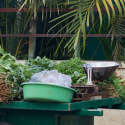Rapid appraisal of food system risks with Covid-19 measures: Voices from the field

Understanding the vulnerabilities of local food systems is a key priority as the world is gaining more knowledge and information of the impact of the Covid-19 pandemic on our food systems. A rapid appraisal carried out by Wageningen University and Research contributes to this emerging understanding of Covid-19 impacts, specifically on perceived Covid-19 control measures and their potential effect on local food systems. Conducted between April 24 and 29, 2020, it covers eighteen Low and Middle Income Countries (LMICs) in Asia, sub-Saharan Africa and Latin America. The study provides several suggestions for measures that could reduce or aid some of the presented effects of the Covid-19 pandemic.
| Document to download |
|
The countries on which this study is focusing already face major limitations and the severity of impact of Covid-19 on food systems is to a large extent dependent on those limitations. The levels of poverty, unemployment and livelihoods, the status of general health and the health care system as well as nutritional status all have an effect on the impact of the Covid-19 pandemic. The study provides a clear overview of the current perceived status of these limitations, and presents an overview of control measures and their perceived early effects in the eighteen countries. This concerns the status and effects on the countries’ food supply chains, food environment as well as consumer behaviour and purchasing power.
Through the collection of information from resource persons in the Wageningen University and Research network located in LMICs, several emerging issues were identified about the ways in which local food systems and nutrition are affected:
- The study concluded that food production is not directly at risk as a result of the Covid-19 pandemic. However, the underlying situation – prevalent before the crisis started – combined with an already looming food crisis as well as disruption of vital food systems linkages and labour shortages all contribute to a complex landscape of potential risks.
- The actions taken to mitigate the impact of Covid-19 seem to disrupt vital linkages (access to markets, institutions and social networks) on which food systems depend.
- Food availability might be reduced because of the impact on food imports due to trade bans. Shorter food supply chains could boost local and regional production in some places.
- Food availability, especially of fresh perishable foods, is expected to decline. Specifically at markets in urban areas. The study suggests efforts should target the supply of these fresh foods to the urban areas as well as finding alternatives to ensure linkages to markets ?are there? .
- Barriers can be created by measures for people’s access to food and by reduced quality of the food consumed, which will have an impact on people’s diets and nutrition. The study suggests the importance to intensify communication on nutrition behaviour.
- An important early action when the burden of Covid-19 reduces, is to reassume schools and school feeding programs. This could ensure adequate diets for children.
- The study finds that the purchasing power of especially urban people can be impacted as income might be reduced and food prices tend to go up. Cash transfers and social protection measures could provide important relief and especially support from the international community is necessary.
- A decline in women’s empowerment is connected to nutrition levels of children and households. Therefore, the study suggests to protect women’s empowerment to increase diets and nutrition levels.
The full study provides detailed information on the emerging issues that were identified, including country specific information on the collected data and several suggestions on measures that could reduce the impact of these emerging issues.






